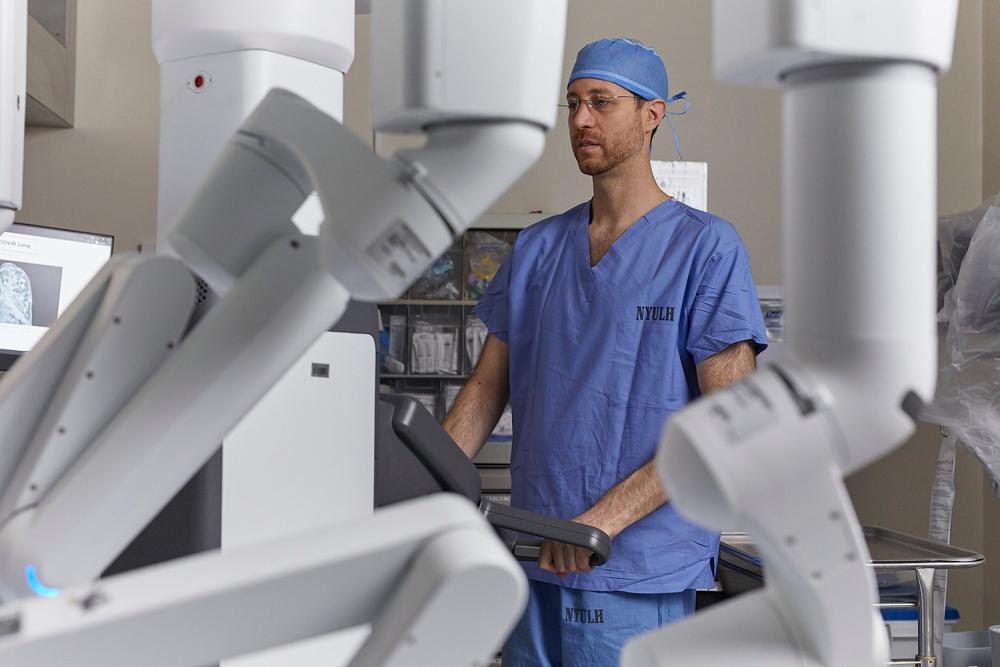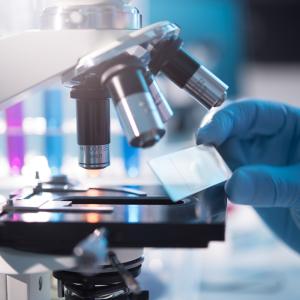At NYU Langone Hospital—Brooklyn, a Tag-Team Approach to Evaluating & Removing Nodules

It takes three: Pulmonologist Dr. Jorge Mercado, robotic lung surgeon Dr. Travis Geraci, and pathologist Dr. Deepthi Hoskoppal team up at NYU Langone Hospital—Brooklyn to diagnose and remove early-stage lung cancer.
Photo: Jonathan Kozowyk
Maria Rodriguez, 62, has been a pack-a-day smoker since she was a teenager, so her primary care physician orders an annual lung cancer screening. This year, the low-dose CT scan revealed a small nodule. Normally, the finding would lead to further imaging tests or a needle biopsy. Instead, Rodriguez, who lives in the Bensonhurst section of Brooklyn, skipped these steps thanks to a novel tag-team robotic approach being pioneered by NYU Langone Health’s Lung Cancer Center, part of Perlmutter Cancer Center.
In March, Rodriguez was wheeled into an operating room (OR) at NYU Langone Hospital—Brooklyn and sedated. There, Jorge M. Mercado, MD, associate section chief of pulmonary, critical care, and sleep medicine, inserted a first-of-its-kind robotic scope called the Monarch through her mouth and airways. Using a handheld controller, Dr. Mercado maneuvered the long, flexible camera deep into her lungs. The scope’s robotic features, which afford unprecedented control, allowed Dr. Mercado to safely travel further into the fragile airways, where he identified and biopsied the suspicious mass. Deepthi Hoskoppal, MD, clinical assistant professor of pathology, meanwhile, evaluated the sample in the OR rather than transporting it to the pathology lab. Within minutes, Dr. Hoskoppal identified the cancerous cells, and Dr. Mercado injected a contrast marker to aid in locating the cancer during surgery. The team then exchanged the robotic scope for a robotic surgical system. Thoracic surgeon Travis C. Geraci, MD, assistant professor of cardiothoracic surgery, identified the area with the cancer and removed a small segment of the lung. Rodriguez was discharged two days later, effectively cured of her stage I malignancy. “I was relieved they caught it and that I don’t require further treatment,” she says.
Diagnosing and treating early-stage lung cancer in one day is a first—for Brooklyn and for Perlmutter Cancer Center. The same-day approach spares patients weeks of worry between appointments. More important, it saves precious time. “Removing lung cancer as early as possible is critical to prevent it from spreading,” says Dr. Mercado.
Brooklyn patients like Rodriguez who require lung cancer surgery are in expert hands. Dr. Geraci was trained by two of the most accomplished robotic surgeons in the country, Robert J. Cerfolio, MD, MBA, director of clinical thoracic surgery, and Michael Zervos, MD, chief of clinical thoracic surgery at NYU Langone’s Manhattan campus. Together, they have completed more than 3,500 robotic thoracic surgeries. “They’ve been at the forefront of robotic surgery for years and were a big reason why I came to NYU Langone,” says Dr. Geraci.
The robotic surgical system Dr. Geraci uses, like those at other NYU Langone locations, offers a minimally invasive approach for removing lung cancers. With a 3D camera providing visual guidance for the surgeon, who operates from a nearby console, tiny surgical instruments mounted on robotic arms permit precise movements. In addition to reduced scarring and a shorter recovery time compared with conventional surgery, “the robotic method has clear advantages for removing a small segment rather than an entire lobe,” says Dr. Geraci.
Robotic diagnostic and surgical procedures are only half the story of Perlmutter Cancer Center’s heightened emphasis on treating lung cancer in Brooklyn. “Our mission is to provide access to underserved, underrepresented communities,” says Abraham Chachoua, MD, the Jay and Isabel Fine Professor of Oncology and medical director of the Lung Cancer Center.
With that in mind, the Lung Cancer Center launched a screening initiative at the Sunset Park Family Health Center at NYU Langone—Second Avenue last August. The program leverages Epic, NYU Langone’s electronic health record system, to identify patients who should be scanned annually based on their smoking history and additional risk factors, including a family history of lung cancer and exposure to asbestos. The initiative has expanded to other Family Health Centers at NYU Langone in Brooklyn and NYU Langone Levit Medical in Midwood, with plans to add additional practices in Brooklyn, as well as in Queens, Manhattan, and Long Island.
Early detection is vital for robotic surgery, generally a viable option only for stage I and stage II tumors. It boosts the effectiveness of other lung cancer treatments as well. At Perlmutter Cancer Center, a National Cancer Institute–designated Comprehensive Cancer Center, these treatments include radiation therapy, chemotherapy, and clinical trials for patients whose mutations are likely to respond to investigational therapies. Brooklyn patients have access to all of these services through Perlmutter Cancer Center—Sunset Park, an airy, 25,000-square-foot facility that opened two blocks from NYU Langone Hospital—Brooklyn in 2019. “We are offering comprehensive lung cancer care and giving more patients access to it,” says Dr. Chachoua. “No other hospital in Brooklyn has a robust screening program like the one we’re building,” he notes.
Maria Rodriguez is a shining example of the difference stepped-up early detection and treatment can make. Two decades ago, she lost her older sister, also a smoker, at age 42 to lung cancer, just a month after diagnosis. “She didn’t get screenings, and by the time they found the cancer, she was at stage IV,” recalls Rodriguez. By contrast, Rodriguez’s scan revealed a suspicious lesion early on, and a team of doctors at NYU Langone was able to remove it quickly. “I’m grateful to Dr. Geraci and Dr. Mercado,” says Rodriguez. “This procedure saves patients time, and it will save lives.”


